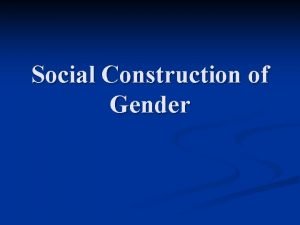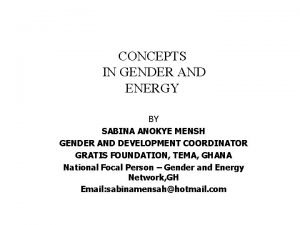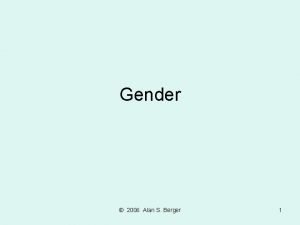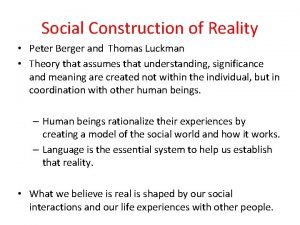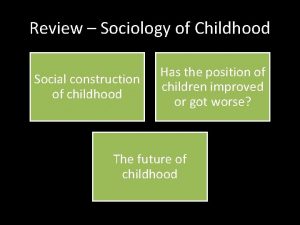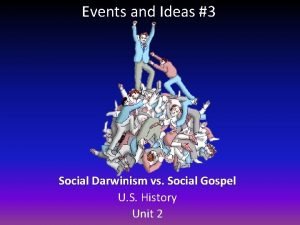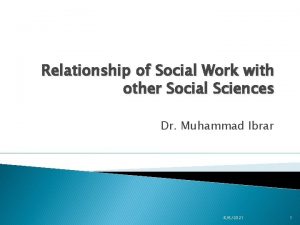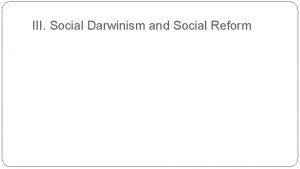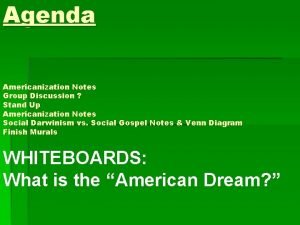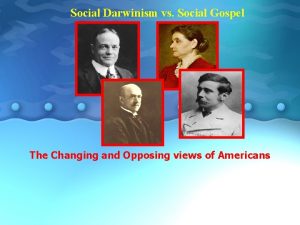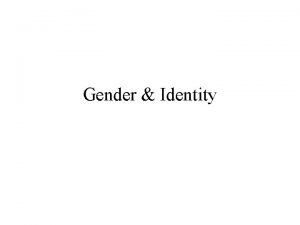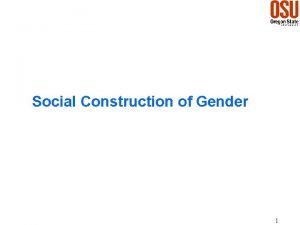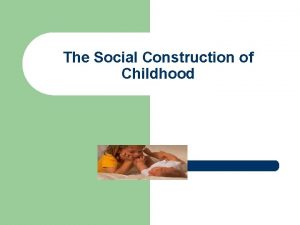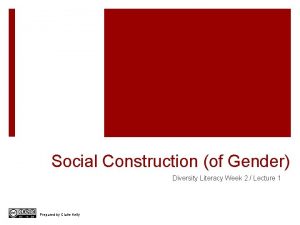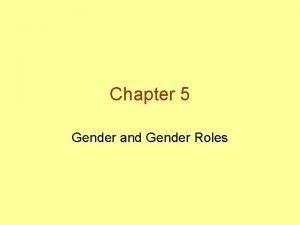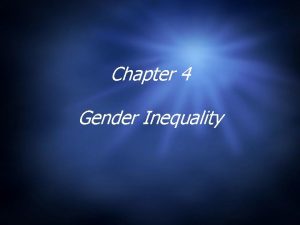Social Construction of Gender Week 2 Gender and























- Slides: 23

Social Construction of Gender Week 2 Gender and Society

Outline • Brief history of 20 th century Western Feminism up to the Second-wave • Sex and gender theories • Relationship between feminism and sociology

Women’s suffrage movements • Campaigns throughout late 19 th and early 20 th centuries in many western countries • Often a tension between claiming the right to political power and claims of ‘normal womanhood’

‘Unnatural women’ • Many of those who argued against women’s suffrage claimed that campaigners were not ‘normal women’ • Ideas about the ‘natural’ role of women often appear in debates today

Representations of Womenhood • Natural • Unnatural • • • Women: Mayor, Nurse, Mother, Teacher, Doctor, Factoryhand Men: Convict, Lunatic, Proprietor of White Slaves, Unfit for Service, Drunkard Suffragettes who have never been kissed

‘natural womanhood’ • Discuss with the person sitting next to you what you think these representations of women are saying about the ‘natural’ role of women.

Between wars • Campaigns for women’s rights continued • Political rights – Education – Employment (especially marriage bar) – Concerns for children • Health care • School meals • Many of these campaigns build on ideas of ‘natural’ womanhood

1960 s • During the 1960 s alongside other social issues women’s place in society was once more subject to widespread public debate • This period is usually linked to the Women’s Liberation Movement

Women’s Liberation Movement • Increased interest and campaigning on women’s right’s issues in North American and Europe • Not one single unifying movement • Mixture of campaigns and organisations – Equality at work – Abortion

Sex and gender theories • Prior to 1960 s gender divisions understood often as a ‘sex-role’ • Developed by Talcott Parsons sex-role was part of structural functionalism • Women were socialised into their roles as wives/mothers • The different roles of men and women complemented each other

Sex and Gender distinction • Sex-role theory did stress socialisation rather than ‘nature’ as a cause of gender roles • 1960 s saw major developments in feminist thinking about sex and gender • Building on sex-role theory feminists began to stress key issues – Split between social/biological – Power

Social Construction of Gender • Anthropology has shown that – All societies have ideas about what activities are ‘normal’ for each sex – But ideas about masculinity and femininity are culturally specific and vary – For example cooking or ploughing may associated with just women, just men or both – These ideas come to be seen as ‘natural’

Sex and Gender • Sex was used to denoted the biological differences between men and women • Gender was adopted as the term to describe the normative roles and responsibilities that were usually associated with each sex. • The conceptual division between sex and gender allowed new strands of feminist thinking to emerge

Sex and Gender • Masculinity • Femininity

Power • Feminists introduced the concept of power to theorising about gender relationships • Gender relationships were seen as hierarchal • However, power is theorised differently within different forms of feminism

Power • Why do you think power is considered such a crucial concept?

Sociology and feminism • From late 1960 s rapid developments in feminist sociology – To develop feminist theories • Adapt malestream sociology – To develop new topics relevant to women • Reproductive health • Caring – To ‘add’ women into existing subjects • Work • Education

Theorising sexual divisions • Liberal Feminism – Equality through the law • Social feminism – Relationship to Marxism • Radical feminism – Patriarchy as a structure

Critiques of early feminism • Much early feminism was based on middle -class white women’s experiences and problems – Working-class women did not ‘return’ to work they never gave it up – Calls for ‘Women’s right to choose’ concentrated on issues such as access to contraception and abortion, and ignored the coerced sterilisation of poor and/or black women

Developments in Feminism • Critiques of the ethnocentric nature of early feminism have widened the research orientation • Recognition that certain groups of women are able to exercise more power than other groups of women and men • Topics such as ‘housework’ now well established as legitimate topics

Sociology and feminism • Feminism has adapted and debated sociological thinking for decades • Sociology has had a more limited response to feminism – ‘Founding fathers’ and malestream theory predominate

Summary • Briefly outlined the development of western feminism • Introduced theories of sex and gender • Outlined the relationship between feminism and sociology

Next week • Focusing on Liberal Feminism • Consider campaigns around gender equality • Look at the equality/difference debate
 Sheena brown
Sheena brown Strategic gender needs and practical gender needs
Strategic gender needs and practical gender needs Week by week plans for documenting children's development
Week by week plans for documenting children's development Stratification of gender
Stratification of gender Social thinking adalah
Social thinking adalah Social thinking social influence social relations
Social thinking social influence social relations Gender inequality quiz
Gender inequality quiz Social construction of childhood
Social construction of childhood The social construction of reality summary
The social construction of reality summary Modelo scot
Modelo scot Social construction of childhood
Social construction of childhood Social construction of technology
Social construction of technology Social darwinism paralleled the economic doctrine of
Social darwinism paralleled the economic doctrine of Difference between social action and social interaction
Difference between social action and social interaction Relation of social work with other social sciences
Relation of social work with other social sciences Social thinking and social influence
Social thinking and social influence What was reform darwinism?
What was reform darwinism? Social darwinism vs social gospel venn diagram
Social darwinism vs social gospel venn diagram Social darwinism vs social gospel
Social darwinism vs social gospel Global agenda for social work and social development
Global agenda for social work and social development Travis hirschi theory
Travis hirschi theory Social thinking and attribution theory
Social thinking and attribution theory A company manufactures and sells x cellphones per week
A company manufactures and sells x cellphones per week Pros and cons of four day school week
Pros and cons of four day school week
